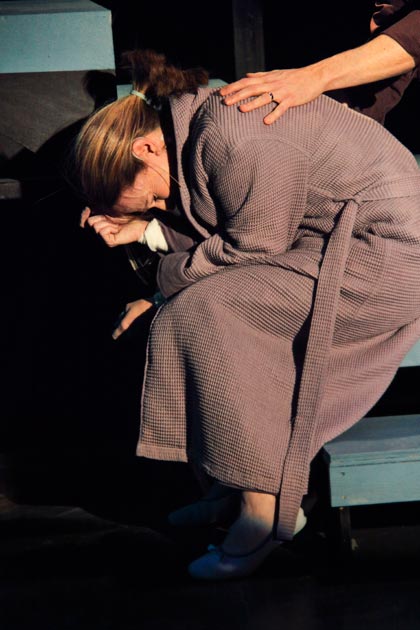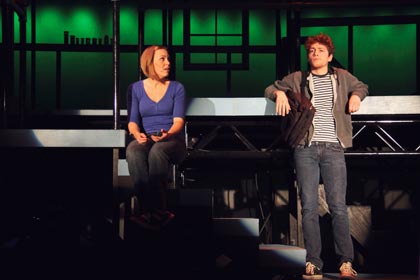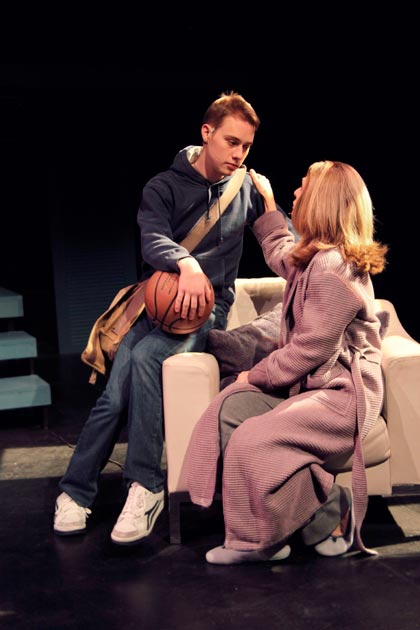Dust is everywhere, cords are hanging from the ceiling and the space is buzzing with workers. I stand awestruck. I knew that a real, professional theater was being built in our beleaguered downtown Eugene, but I’ve wanted it too much to believe. Local playwright and retired judge Greg Foote shakes me out of my stupor, yelling, “Hand her a broom!” as he cheerfully mops past me.
Continuing my tour of the theater, I see state-of-the-art control rooms, sky-lit rehearsal spaces and a well-positioned scene shop. The lobby is stunning with soft colors and beautiful globes of light hanging from the ceiling, their radiance reflected in the polished cement floor. It feels like an honest professional theater, like they have in Portland or Ashland.
And it is. For nearly 20 years the Lord Leebrick Theatre Company wrestled inside the cocoon of the Charnelton space, and it has now emerged with a new name in a new space with a new production in tow. As of Jan. 25, theatergoers will see the new Oregon Contemporary Theatre (no relation to the former Portland company) company perform at the Lord/Leebrick Playhouse at 194 W. Broadway starting with the opening night of Next to Normal.
Rising Action
It was an easy Sunday morning in February 2009 when the Lord Leebrick Theatre Company Artistic Director Craig Willis and then-Board President Donald Van Houten sat in their respective homes in their respective pajamas, reading a story in the paper about groups interested in the 194 W. Broadway property. The two men set down the paper and reached for their phones. “I don’t remember who called who,” Willis says. “It was nearly simultaneous.” But a connection ran through and the two hatched a plan to build a theater.
With enraged tango dancers (the popular Tango Center was displaced), a recession and countless city ordinances, the building of this theater has had more than its share of excitement. “Yes, I prefer my drama on the stage,” Willis quips.
Set Designer Steen Mitchell credits Willis’ perseverance through the dark days, “Craig’s effort has made this happen. It takes vision and strong leadership.” The pressures of leadership can be tough, even for someone who Van Houten describes as having “a striking combination of artistic and financial skills.” Willis remarks, “The stress has at times been intense, for sure. I remember one time literally crying upon learning that we had received a federal stimulus grant.”
While attempting to physically grow their space, the organization was expanding rapidly as well, the staff and the operating budget have more than tripled since Willis came on board. With their expanded space Oregon Contemporary Theatre (OCT) can run more classes and more summer camps. The next phase of development includes a 99-seat black box theater.
 |
| Mars reprises her role as Goodman mother struggling with bipolar disorder |
 |
| Evynne Hollens as daughter ‘Natalie Goodman’ and Tyler Ankenman as her boyfriend ‘Henry’ |
 |
| Evan Marshall as son ‘Gabe Goodman’ with Mars. All photos by Athena Delene. |
A Second Act
There are so many perks to the new space: bona fide dressing rooms, well-lit and monitored parking just across the street, no train whistle going off in the midst of a dramatic scene, a sizable lobby in which you are not required to snuggle with strangers while getting your tickets. OCT has kept the three-quarter round format, but the seats have such a steep rake that you can still see perfectly no matter what hairdo sits down in front of you.
“It was fun to see bits and pieces of the old space we brought with us,” Mitchell says. The seats, still in great condition, traveled down Charnelton, along with counter tops and old props dug out of the attic. But Mitchell concludes that what they ultimately brought with them was “the heart of Lord Leebrick, the spirit of the theater.”
Current Board President and UO English professor Harry Wonham is similarly thrilled about something that is not new: “It may sound odd, but one of the things I am most excited about is the fact that the new theater will preserve the intimacy and immediacy that so many theatergoers … loved about the Charnelton site. The new space will be vastly nicer in every respect, but in terms of atmosphere and audience perspective, it will have a familiar feel.”
What are folks happy to leave behind? “The tiny dressing rooms that you couldn’t ever talk in, because you’ll be heard on stage,” Foote says. And then there’s the outdoor alleyway, which apparently served as everything from greenroom to an on-stage entrance. “I look forward to a theater with work lights that function and a scene shop instead of a folding table with a chop saw set up in a rainy parking lot,” Mitchell says.
Yet the Broadway building itself is a space left behind by much of Eugene years ago.
Devoid of the native cynicism regarding the six streets crisscrossing Eugene’s downtown, Willis is excited, saying, “The renaissance [of downtown] is much more than a glimmer. It’s a beacon starting to shine and I believe in eighteen months it will be very bright.” He notes that as businesses filter in, so do people. And OCT plans to bring another 12,000 pairs of feet treading down Broadway and into their seats each year. “That’s more than a $1 million economic impact,” Willis notes. Combine that with the grant money and the workforce involved with the new theater, and you have a viable organ in the heart of Eugene.
Not everyone is happy with the changes. “We will always be parents of this company, so of course we wish it well,” original founders Chris Leebrick and Randy Lord jointly responded by email. “But we do think the name change will be a mistake. People like the name, and they recognize it. Lord Leebrick has a 20-year history … Honestly, we can’t help but wonder if it’s just a way of getting around the awkwardness of changing the name and the beginning of a way to phase out the legacy of the founders.”
Next To Normal
Not only is OCT opening a theater Jan. 25; they’re opening a play. Next to Normal is a force, garnering 11 Tony nominations and a Pulitzer Prize when it opened in 2009. This pop opera tells the story of an American family: mom, dad, two kids and a struggle with bipolar disorder. According to the Pulitzer Board, Next to Normal is “a powerful rock musical that grapples with mental illness in a suburban family and expands the scope of subject matter for musicals.”
Willis says, “It’s incredibly moving and filled with unforgettable moments … it was the perfect bold piece of contemporary theater needed to launch the next stage of our company’s trajectory.”
Portland actress Susannah Mars will portray the mentally ill mother, Diana. Her preparation for this difficult role has included extensive research, reading, discussions with doctors and finally, looking into the script to connect her understanding of the disease to the role. All this hard work isn’t hard to Mars, “I don’t think it’s difficult. I feel she is a unique person with a unique set of circumstances … My hope is that audiences will talk about the topic of mental illness, and [the show] will help people reach out to others who may be suffering.”
Mars has enjoyed working at OCT, which she describes as “very warm.” I asked if it was a bit nerve wracking preparing to open a show in a theater that’s not quite finished. “You know … it’s funny,” she says, “usually in theater there is a set to be built … I keep forgetting that in this case it’s an actual theater that has to be built!” She attributes her laissez-faire attitude to the calm demeanor of Willis.
But Mars’ professionalism doesn’t let the rest of the cast off the hook. The show is vocally and emotionally demanding. Filling out the rest of the cast are local talents Evynne Hollens, Evan Marshall, Brian Haimbach, Gene Chin and Tyler Ankenman.
While opening night will be a formal affair, Willis points out that this is a soft opening. OCT plans to have a “truly grand opening in May.” Willis acknowledges that this is difficult with a theater. “It’s hard to have the kind of soft opening you might with a restaurant or a retail business. Theater is about making spectacle after all … just know that this spectacle is going to be further refined in the next several months.” So this opening is more akin to writing a novel than opening a play. We’ll be seeing an early draft Jan. 25, and we can watch the process as they polish off the rough edges over the next few months creating something that can withstand time and change.
A Community in the Round
“Making a move like this takes a group,” Mitchell says. “Every single person who picked up a tool or made a phone call has contributed to this theater. It belongs to everyone.”
OCT has hired superb building professionals and been tireless in its pursuit of grant money. But building and funding this theater from the start are actors, stage managers, board members and folks who just enjoy good theater. Volunteer and actress Alisa McLaughlin has been helping since “the demolition work on the new space … There was a lot of shoveling up the asphalt tiles, which are very heavy by the way.” And then there was her shamanistic cleansing of the back stairway, which, according to McLaughlin, “was majorly haunted.”
But most folks have just popped in for a workday whenever they can. Local actor and playwright Tim McIntosh likes the way OCT has kept folks informed and involved with what’s going on. “It feels like community,” he says.
Ultimately, Oregon Contemporary Theatre is excited to have the opportunity to do their part for our town. “Eugene truly is a remarkable place to support the vast quantity of art we have access to,” Willis says. “I feel blessed to have the opportunity to make this contribution. This new performance venue will allow us to achieve a high level of artistry in our work, and I hope everyone agrees that this is an exciting new asset for a town with such remarkable wealth in culture.”
